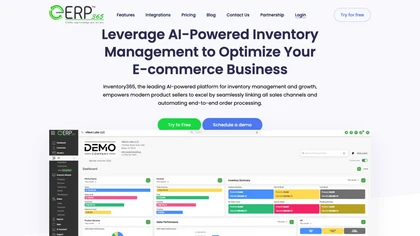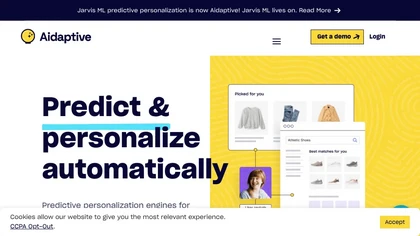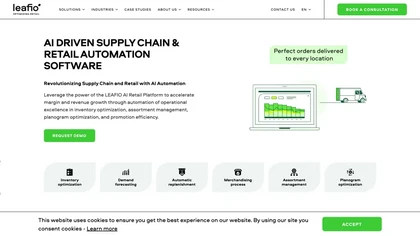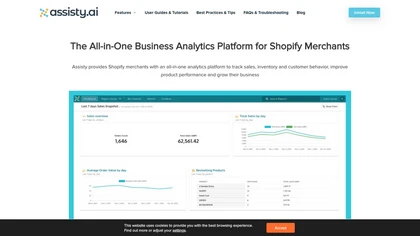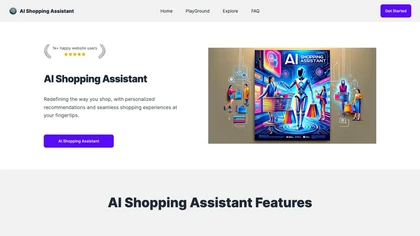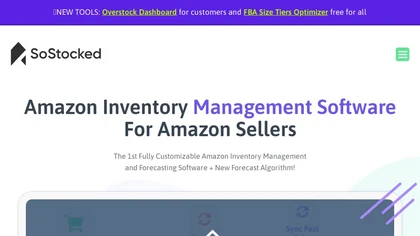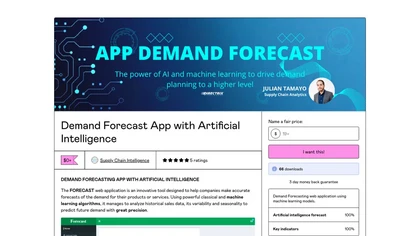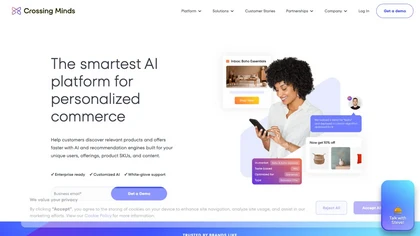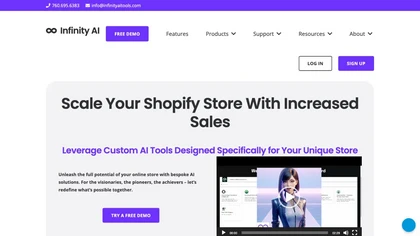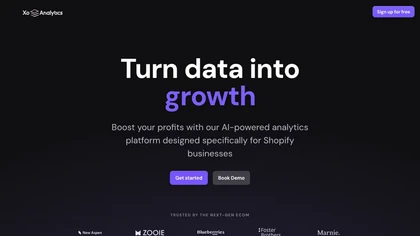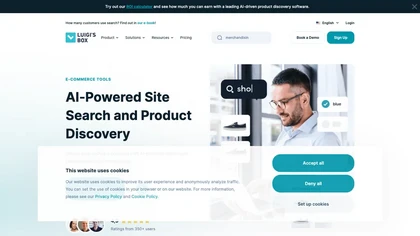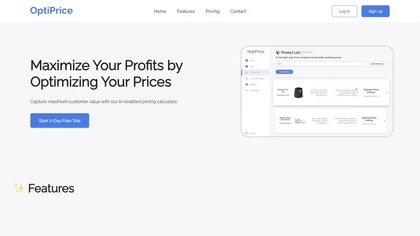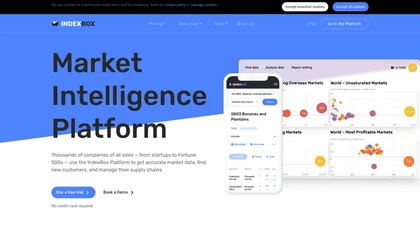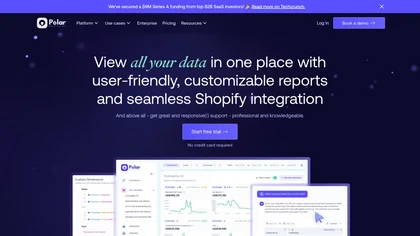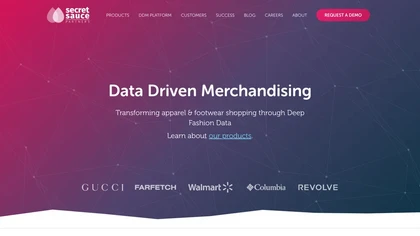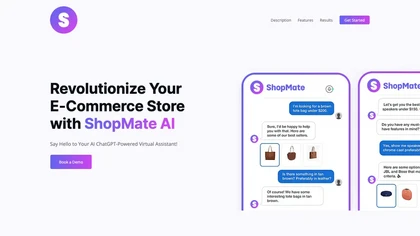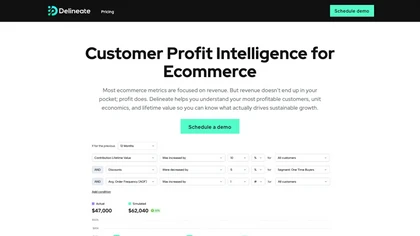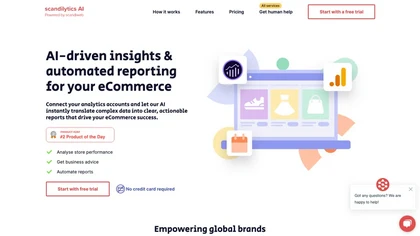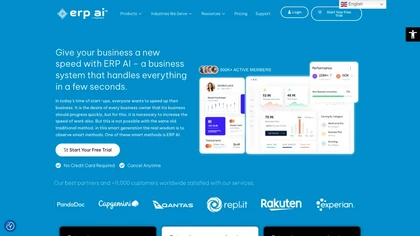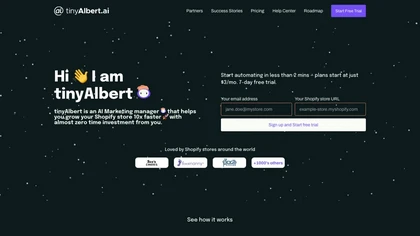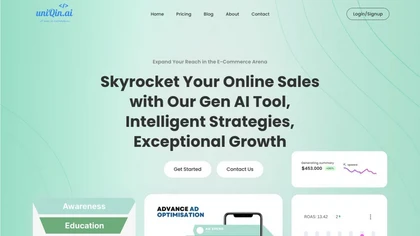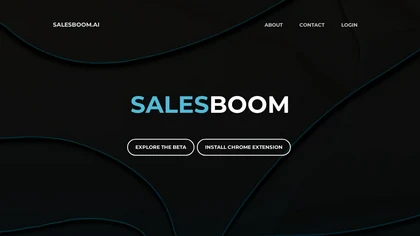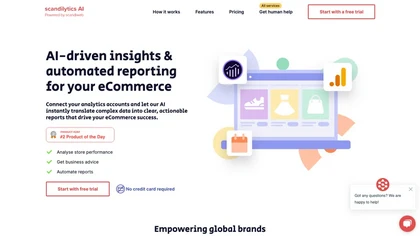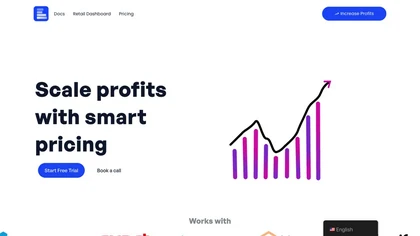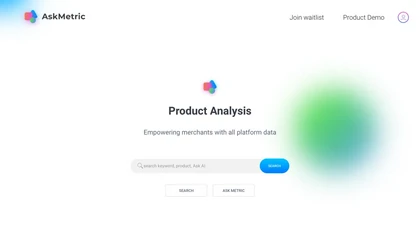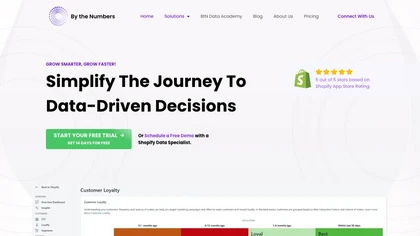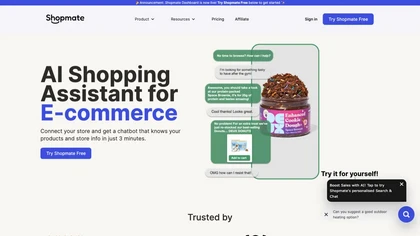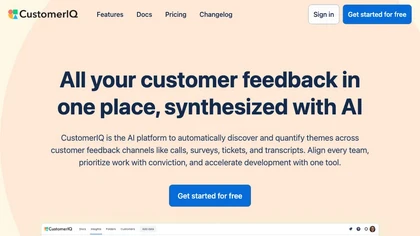AI use cases for Retail Sales
Generative AI can be applied in various applications for retail sales. Here are some examples to explore below for inspiration with AI tools to get you started with using AI in retail sales.
🛠️ 70 AI tools for Retail Sales
Explore a dynamic list of some of the most popular tools to get you started with various AI use cases and applications for Retail Sales to streamline your workflows and productivity today.
Inventory365 features
- Real-Time Inventory Tracking
- Warehouse Management
- Multi-location Fulfillment
- AI-Powered Demand Prediction
- Seamless Integration
Aidaptive features
- Recommendations
- Pricing
- Search
- Merchandising
LEAFIO AI Retail features
- AI-driven supply chain and retail automation software
- Automation of inventory optimization, assortment management, planogram optimization, and promotion efficiency
- Features such as demand forecasting, automatic replenishment, and merchandising process optimization
- Caters to various industries including retail, grocery, convenience stores, pharmacies, liquor stores, etc.
- Comprehensive suite of AI-powered tools to streamline retail operations and drive profitable growth
Potions features
- Personalized product recommendations
- Smart sorting of list pages
- Cookie-free personalization technology
- Seamless integration
- Real-time performance monitoring
retalon.com features
- Predictive analytics
- Demand forecasting
- Merchandise planning
- Smart fulfillment
- Ecommerce operations
Incremental ai features
- Retail media measurement
- Commerce analytics
- Portfolio management
- Predictive analytics
- Cross-channel commerce analytics
assisty.ai features
- Retail chatbot menu tool
- Generating inventory and sales reports
- Exporting data and creating custom dashboards
- User-friendly pre-built reports
- Advanced data drill-down and automation capabilities
🔥
Create your account, save tools & get personal recommendations
Receive a weekly digest of our handpicked top tools.
Unsubscribe anytime
Standard Retail. features
- AI-powered retail analytics
- Comprehensive overview of store performance
- Leverage first-party data
- Uncover hidden trends and patterns
- Actionable recommendations
AIShoppingAssistant features
- Personalized recommendations
- Price comparison alerts
- Virtual try-on with augmented reality
- Voice-text interaction
- Enhanced shopping journey
SoStocked features
- Amazon inventory management
- Forecasting
- Customizable features
- Data migration
- Personalized onboarding support
V-retail features
- Simulates in-store personalized experiences online
- Engages potential customers through live chat, voice, video calls, and remote assistance
- Provides real-time conversations
- Offers advanced analytics insights
- Seamlessly integrates with existing websites across devices and operating systems
Demand Forecast features
- Utilizes classical machine learning algorithms
- Allows uploading data sets from Excel
- Automatically selects the best model for each product
- Provides clear visualizations and interactive graphs for demand predictions
- Includes features like historical data analysis, outlier detection, model competition algorithms, and KPI forecast systems
crossingminds.com features
- Data enrichment with intuitive tags and properties
- Personalized product recommendations for various industries
- Behavior-based approach to recommendations
- Seamless integration with existing tech stacks
- Driving cross-selling and upselling opportunities
Manifest AI features
- Product recommendation
- Natural language processing
- Customization
- Purchase decision support
- Multilingual
Siesta features
- Personalized marketing guide generation
- Survey completion in 15 minutes
- Tailored to unique business needs
- Step-by-step instructions
- Convenient to-do list for tracking progress
Innosearch AI - Shopping Assistant features
- product discovery
- NLP based search
- real time eCommerce recommendations
- eCommerce data and expert insights
5-Out features
- Predicting sales
- Optimizing labor
- Optimizing purchasing
- Quick setup
- Getting started
Skipped features
- Collaborative fulfillment platform
- Enables selling out-of-stock product variants
- Real-time e-commerce network
- Capturing sale opportunities easily
- Sharing of margins within merchant network
ConsumerAI features
- Product recommendation
- Ai based
- Question
- Problem solving
Outfits AI features
- Generate outfits
- Recommend outfits
- Create outfit plans
- Suggest accessories
- Provide style advice
GearChain features
- Real-time AI-powered inventory management
- No-code builder for customizing forms and generating barcode scans
- Blockchain technology for data integrity and transparency
- Role-based access control for security
- AI algorithms for auto-generating forms
Shopifinity Engine™ features
- Utilizes Shopifinity Engine™
- Automates tasks like content creation and sales support
- Personalized marketing campaigns based on detailed customer data
- Suresell AI for boosting sales
- ConsistentVoice for maintaining brand tone
Buysmart features
- Personalized recommendations
- Advanced algorithms
- Tailored suggestions
- Decision-making analysis
- Efficient shopping experience
Recommendix features
- Interactive quiz features
- Quiz creation without programming knowledge
- Advanced analytics and action plan
- Wide range of integrations (Shopify, Google Analytics)
- Customization of widgets for seamless integration
XO Analytics features
- E-commerce analytics platform
- Next-gen e-commerce integrations
- Customizable alerts
- Real-time performance monitoring
- Personalized data-driven tips
Luigi's Box features
- AI-powered search functionality
- Advanced CEE language support
- API integration for data exchange
- Dynamic search filters for relevant results
- Personalized product recommendations
OptiPrice features
- AI-enabled pricing calculator
- Competitor price monitoring
- Utilization of machine learning algorithms
- Pricing performance analytics
- Free 7-day trial
IndexBox
5IndexBox features
- Access to accurate market data
- User-friendly interface for quick generation of market reports
- Predictive modeling for forecasting market trends
- Machine learning capabilities
- Data integrity through cross-checking from multiple sources
Polar features
- 1-click integrations
- Custom reporting dashboards
- Predictive forecasts
- Smart alerts and insights
- First-party attribution
Convictional features
- Streamline onboarding vendors
- Standardize product content for retailers
- Reduce merchandising tasks by up to 75%
- Automated vendor payouts through integrated systems like Stripe
- Supports a range of integration methods with major ecommerce platforms like Shopify and Magento 2
secretsaucepartners.com features
- Fit Predictor
- Style Finder
- Outfit Maker
- Seamless integration
- A/B testing
Smartersales features
- Integration with zoom, teams, and meet
- Automated crm data entry
- Instant personalized feedback
- Detailed performance dashboards and summarized email reports
- Customizable experience
Enalito 2.0 features
- Segmentation
- Campaigning
- User journey automation
- On-site personalization
- Subscriber popups
CartBuddyGPT features
- GPT-powered shopping assistant
- Product recommendations based on needs and budget
- Built-in plotting and visualization tools
- Price comparisons and product ratings
- Expert recommendations based on analyzed data
Intellimize features
- Personalized marketing
- Website optimization
- Machine learning
- Conversion acceleration
- Faster results
Testmarket Analytics INC features
- Keyword analysis for product listing optimization
- Multi-platform sales-boosting services
- Google ads management
- Advertising optimization services
- Campaign creation support
ShopMate features
- AI ChatGPT-powered virtual assistant
- Personalizes recommendations
- Upsells/cross-sells
- Engages customers in real-time
- Available 24/7 for customer inquiries
Delineate features
- Unified analytics for financial, customer, product, and marketing insights
- AI predictive lead scoring
- Customer analytics, cohort analysis, customer lifecycle analysis, and customer segments
- Scenario simulation
- Data integration from various sources
GoWit features
- Omnichannel advertising platform
- AI-powered bidding engine
- Integration of self-service and white-label features
- Activation of first-party data for customer insights
- Precise targeting and personalized campaigns
SaaS Library features
- Product idea generation
- Market strategy development
- Revenue model analysis
- Persona insights
Finalview features
- Product review analysis
- Sentiment analysis
- Feature and performance insights
Data Analyst AI features
- Data Analyst AI
- Automated reporting
- Tailored marketing strategies
- Streamlined marketing efforts
- Secure data processing
MEJ ERP AI features
- Intelligent automation
- Data-driven insights
- Real-time analytics
- Predictive forecasting
- Seamless integration capabilities
TinyAlbert features
- Automated tool for boosting marketing strategies
- Streamlines key marketing activities using AI playbooks
- Expert functionalities in copywriting, email marketing, and delivery
- Saves valuable hours weekly by replacing the need for an email service provider or marketing manager
- Ideal for solopreneurs, small teams, and established businesses
Reform features
- Modular building blocks for customized solutions
- State-of-the-art multimodal AI models for logistics documentation
- Automation of data capture for various documents
- Seamless integration with universal transportation management systems (TMS) through a universal API
- Embeddable customer dashboards for real-time data insights
uniqin.ai features
- Automated analysis and reporting
- Real-time insights for informed decisions
- Advanced analytics for deeper market understanding
- Data-driven strategies for performance tracking
- Amazon ads optimization
Yepp features
- Individually tailored AI responses
- Integration with team processes
- Marketing intelligence
- Data retrieval and analysis
- Automating Tedious Marketing Tasks
Acobot features
- Assisted shopping
- Lead generation
- Cart recovery
- Email marketing
- Conversational UI
Shaped features
- Personalized recommendation system
- Real-time recommendation generation
- Industry-specific recommendations
- User engagement analysis
- Easy-to-use api tool
Maverick features
- Personalized video generation
- Massive scale
- Ecommerce revenue boost
- Ltv increase
- Ai-generated video
bodify.io features
- Predictive analytics
- Improve return rates
- Increase average cart value
- Boost shopper loyalty
SalesBoom features
- Personalize emails
- High quality
- Faster outreach
- Scale
Mom shop app features
- AI-powered features
- Streamlined e-commerce
- Effective service management
- AI-generated content
- Simplified order management
Scandilytics features
- Advanced analytics for store performance insights
- Business advice based on data analysis
- Automated reporting processes
- Connection with analytics accounts for data translation
- AI-based trend analysis and opportunity identification
Scanlist features
- Real-time scanning of business contacts
- Access to high-quality data
- Exporting leads from LinkedIn Sales Navigator searches
- Enrich extracted lists with personal and business emails
- Marketing assistant feature for creating marketing copies
Marketer features
- AI-generated price optimization
- Lead generation tools
- Targeted marketing strategies
- Visualization of new build projects
- Automation of manual processes
Prycing features
- Smart pricing solutions
- Competitors' pricing insights
- Product competitiveness overview
- Price comparison feature
- Automatic price adjustment
AskMetric features
- AI technology
- Metrics visualization
- Keyword searching
- Product recommendations
- Real-time tracking
Cherry features
- QR code scanning
- Product discovery
- User-friendly interface
- Intelligent search capabilities
- Personalized online shopping experience
Collider AI features
- Ad generation
- Webpage generation
- Email generation
- Sales problem solution
- Early access
Topzeal features
- Product creation
- Sales amplification
- Marketing copy generation
- Full-link data asset deposition management
- Intelligent label classification management
bythenumbersapp.com features
- Advanced ecommerce reporting
- AI segmentation
- RFM loyalty reports
- Cohort analysis
- Predictive forecasting
Sku Fetch features
- Data fetching from multiple suppliers
- Support for popular marketplaces
- Keyword finder and product UPC addition
- Competition analysis and reviews integration
- Leverages OpenAI capabilities for rewriting and summarizing
FounderPal Virtual CMO features
- Marketing problem solving
- Quick recommendations for various marketing tasks
- Optimization of marketing strategies
- Valuable insights
- Overall marketing performance enhancement
Shopmate Chat features
- Personalized product recommendations
- Intelligent customer support
- AI-powered product discovery
- Customizable branding
- Integration with popular e-commerce platforms
Shown features
- Automated ad targeting
- Automated copywriting
- Ad creatives creation
- 24/7 ad optimization
- Campaign performance monitoring
Glov features
- AI supervised mini-robots
- Market-tested
- Copy Rewriter feature
- Social Badger feature
- Behavior Graph
CustomerIQ features
- Aggregate feedback from various channels
- Powerful analytics for customer feedback
- Chat with data
- Automated segmentation and tagging
- Multiple integrations available
SellMate features
- Cross-listing on major e-commerce platforms
- AI-generated descriptions
- Advanced analytics for data-driven decisions
- AI-powered pricing insights
- Real-time analytics insights
PriceGPT features
- AI-powered tool
- Provides pricing insights
- Optimizes pricing strategies
- Saves time
- Revolutionizes pricing approach
